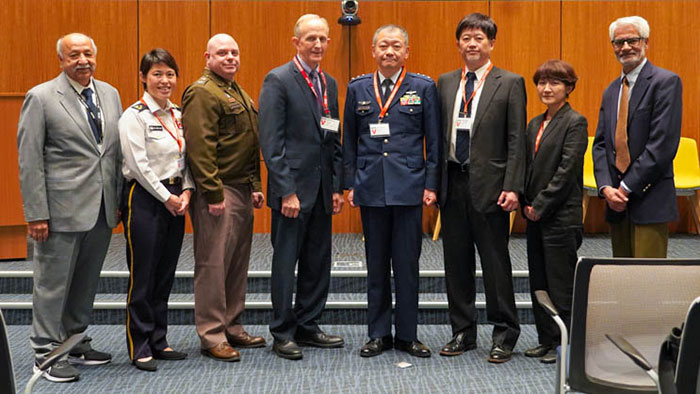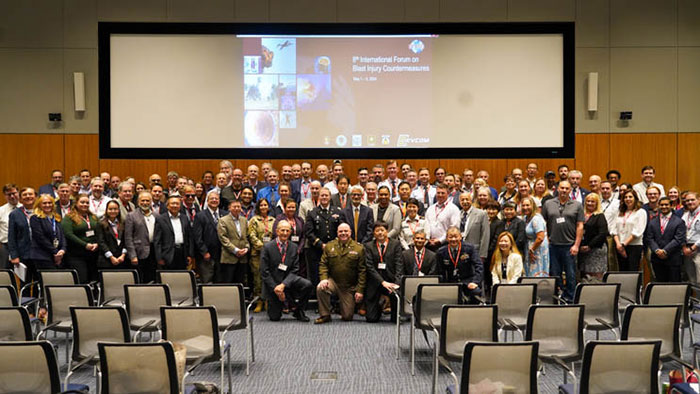Brain Injury Experts and International Nations Talk Future of BOP Monitoring

Over a hundred researchers from the U.S., Japan, Canada, Germany, Australia, Italy, South Korea and the U.K. shared their latest research in the prevention and treatment of injuries caused by high pressure shock waves produced by explosions and the firing of heavy weapons at the 2024 8th International Forum on Blast Injury Countermeasures held in McLean, Virginia May 1-3.
IFBIC, which is co-sponsored by the U.S. Army Medical Research and Development Command's DOD Blast Injury Research Coordinating Office, brings together international experience, broad knowledge and expertise within the blast injury field, and aims to create joint research opportunities that address specific scientific and technical challenges. The forum participants share an enduring commitment to optimize brain health.
For years, the DOD has invested in addressing blast injury, but what is less well known is the large extent of research and funding the DOD provides, according to one of three keynote speakers at the event, Dr. David Smith, Deputy Assistant Secretary of Defense for Health Readiness Policy and Oversight. In 2023, the DOD officially launched the Warfighter Brain Health Initiative, which addresses the most prominent brain injury threats for Service Members.
"Our major efforts are to identify, monitor and mitigate brain threats," says Smith. "The Department of Defense is keenly focused on better-protecting brains from unnecessary blast exposures and seeks to improve the effects with a robust strategy like the Warfighter Brain Health initiative, which will improve our understanding and return Warfighters to duty."

Implementing the Warfighter Brain Health Initiative is a priority for BIRCO, which fills critical knowledge gaps in blast injury research for the DOD. BIRCO's motivation for co-sponsoring IFBIC is to help increase knowledge about blast injury prevention and treatment and to foster international collaborations to bring that about.
"Blast injury research is a complicated topic," said BIRCO Deputy Director & Science Advisor, Dr. Raj Gupta. "There is a lot of emerging multi-disciplinary research for blast injury, but countries can only do a small piece of it. If we can leverage the international community to learn from each other, collaborate and share their data, this can expedite our understanding of blast injury mechanisms, including the fielding of treatment and prevention strategies."
With the need for core research across international disciplines, the 8th IFBIC aimed to:
- Focus on the multi-disciplinary science and medicine necessary to increase the understanding of blast injury and countermeasures from bench to bedside
- Achieve a mutual understanding of international efforts in blast injury research
- Identify knowledge gaps that may require collaborative research
- Understand and promote further collaboration to improve prevention, clinical diagnosis and treatment across the entire spectrum of blast-related injuries
The forum is a near-decade-long effort to advance opportunities for blast injury research. In 2016, the DOD and Japan's Ministry of Defense signed the U.S.-Japan Data Exchange Agreement, establishing the Japan-U.S. Forum on Blast Injury. As interest and the need for more international expertise grew, JUFBI formally changed its name to IFBIC in 2019 to include the work of other nations.
One tool of interest that was demonstrated at this year's forum is BIRCO's newly adopted Blast Overpressure Tool for range safety. The BOP Tool can predict blast pressures at different locations and the effects of blast waves during TBI occurring in Service Members and personnel. Safety range officers can better evaluate and inform safety protocols during heavy weapon training through models predicted by the tool.

"What we ended up with is a tool that has the capability to monitor and investigate incidents of blast overpressure and actually predict the blast overpressure of a Service Member when they are planning to fire a weapons system," says Gupta. "It gives added capabilities with weapons systems that in other scenarios may not be calculated or explored."
Beyond achievements and blast injury countermeasures, the forum served as a space for deep dialogue about how to implement the findings shared at IFBIC at the tactical and strategic levels. Some participants noted that more specific markers and testing for blast injury are needed in training environments, while others expressed the need for more global data. Many participants concluded that communication needs to continue between researchers and government leaders to develop procedures that mitigate blast injury, charging attendees of the forum with a significant call to action.
Reflecting on the outcomes of the 8th IFBIC, Gupta expressed the desire for forum participants to gain a more holistic understanding around the mechanisms of blast injury.
"As seen by information shared by Italy and other researchers, they are looking at the very basic question of what force actually initiates dysfunction at the cellular level that could help understand blast injury," says Gupta. "Currently, we have cures, but there is no scientifically proven mechanism for blast injury, which more scientific research can help address."














